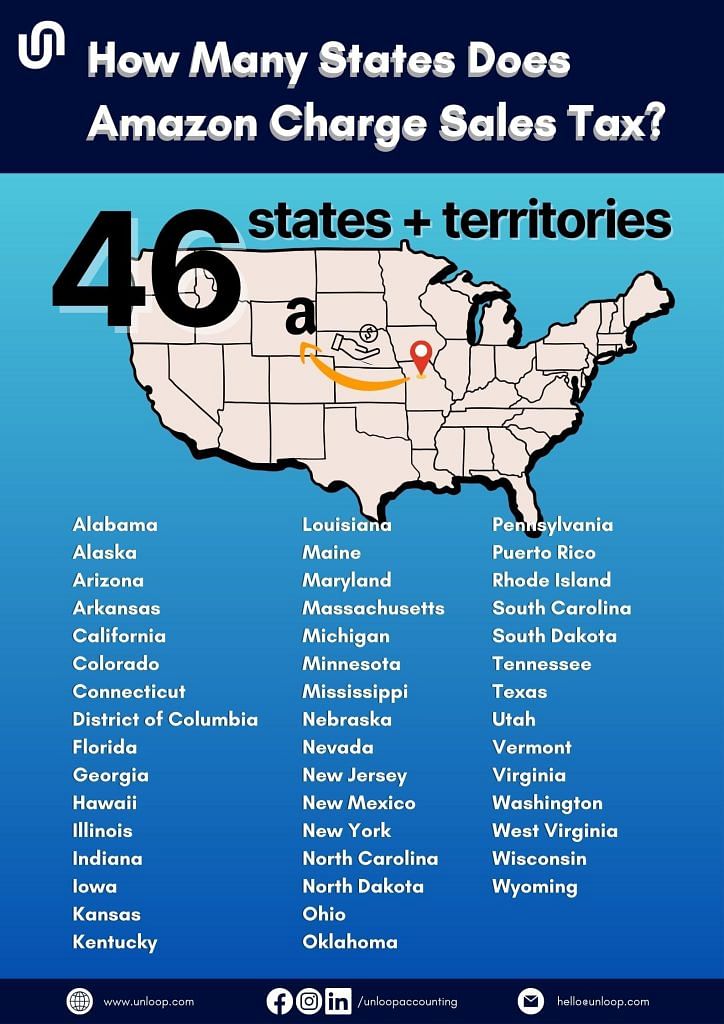
Disclaimer: Please note this article is not financial advice. The purpose of our blog is purely educational, so please consult a professional accountant or financial advisor before making any financial decision.
Understanding sales tax is essential for any business owner and Amazon seller. After all, you are responsible for collecting sales tax if you're a third-party merchant. Unfamiliar Amazon merchants may ask questions like “How many states does Amazon charge sales tax,” and “What type of sales tax do they collect?”
To quell some of your first-time seller worries, let’s run through these questions and take some time to learn about Amazon sales tax. It could save your business from unexpected fees or penalties down the road!
Sales tax compliance is the root of many concerns for online sellers, particularly on Amazon. While it may not be the most exciting topic, addressing these concerns is essential for any e-commerce business.
In this section, we'll break down some of the most common Amazon sales tax concerns in a straightforward, no-nonsense manner.
Amazon collects sales taxes on "Fulfilled by Amazon" products sold to customers in states that have adopted Marketplace Facilitator, Marketplace Fairness, or similar laws and where the seller has a nexus (presence or location, such as a warehouse).
📝Note that Amazon only takes into account where the inventory is currently located.
As a result of these restrictions, the marketplace on which the merchant relies to make a sale takes on the role of a collector.
However, a third-party Amazon seller must still set up their own tax accounting system to keep up with the regulations and filing dates. In short, if Amazon fulfills your products, you don't need to worry about sales taxes, but that comes with its cons, such as increased returns due to Amazon's return policy.
For years, consumers have enjoyed shopping online without paying sales taxes on their purchases. It seems like an unfair advantage: laws have long required brick-and-mortar stores to collect sales taxes in every state where customers shop in person.
However, they didn't pay sales taxes because no physical presence was required for ecommerce merchants or marketplace sellers, like Amazon FBA sellers who shipped through third parties.
This setup has evolved due to the implementation of "Amazon Laws" by various states. These laws mandate that online retailers located outside their borders, even those who sell indirectly, must now collect online sales taxes from customers residing within those jurisdictions.
Amazon collects and processes state sales tax from 46 American states and areas, including D.C., which contrasts with a sales tax nexus. Below is a list of states where customers must pay sales tax on their Amazon online purchases.

The sales tax nexus is where a business operates, not the location of the buyer or where the product is going. For example, if a seller maintains physical locations in several states, such as offices or in-store retail shops, the seller must know each state's tax regulations.
Amazon also offers its own Sales Tax Calculator to help sellers determine the appropriate sales tax rate to charge their customers.
If you're wondering, "How much sales tax does Amazon charge?", the total tax for your purchase will be based on several variables, including but not limited to the following:
The total state and local tax rate in effect at the location of delivery or fulfillment will be the rate charged to your order. For example, if your product is being transported to a state with a sales tax, you may still be charged sales tax even if you are in a tax-free zone.
If you're an FBA vendor, the procedure is still taxing, but Amazon can help you do the job efficiently.
Amazon customers are required by law to pay state sales tax in jurisdictions where Amazon operates retail warehouses, including any warehouses, offices, or other facilities in a state owned or leased by the ecommerce giant or its affiliates.
In addition, Amazon is required to collect tax if they charge shipping and handling (S&H) and other fulfillment-related services performed at their fulfillment centers.
The laws vary from state to state but generally require you to collect sales tax if you're doing business there and make charges for S&H or fulfillment services.
When dealing with Amazon sales tax, you must be aware of the different sales tax types that may apply to your business, such as state and local taxes or county taxes. You must also understand how each product code is taxed in these places.
Each jurisdiction has its own sales tax laws. Therefore, you must research the specific sales tax laws for the state or states you are doing business in.
Also, some localities within a state may have their own sales tax laws. For instance, Seattle has a local sales tax of 3.75% combined with Washington's state sales tax of 6.50% for a total of 10.25%.
Some jurisdictions also charge their taxes in addition to state and local taxes. These fees, ranging from 0.5% to 2%, are generally added on top of state and local sales taxes. Furthermore, certain counties may have different rules regarding sales tax collection.
Another factor to consider is how different products are taxed. For example, you may sell goods, digital content, or services, such as streaming movies or consulting services, which can all be charged differently.
For sales tax on goods sold on Amazon, you must know the rates that apply to different products in your state or locality.
In addition, some items may be exempt from sales tax collection altogether. These include food and certain types of clothing. However, these exemptions may vary.
Do your research to ensure that you correctly charge sales tax on all of your products with the right product tax code. You can find this information on Seller Central.
As mentioned, Amazon FBA sellers don’t have to do much regarding sales tax collection from customers in states with Marketplace Facilitator laws. Amazon handles all the sales tax calculations and remittances for them.
However, with Amazon FBM, it'll be entirely up to the seller to ensure that the proper amount of sales tax is collected from buyers.
One of your main goals should be to maximize your profits while minimizing potential issues with the tax collection authorities.
Several key steps can help you achieve these goals, such as carefully reviewing the tax laws for your state or locality and familiarizing yourself with the different types of taxes that may apply to your products or services.
Additionally, keeping accurate records of your sales and purchases is important to ensure that you are correctly calculating and remitting any taxes that may be due.
There are plenty of pros to understanding sales tax. For one, you can avoid penalties and interest charges if you mistakenly fail to remit or collect sales tax. Additionally, you can accurately calculate your taxes owed, which will help you stay organized and efficient come tax time.
As you can see, there are varieties of Amazon sales tax that may apply to your business. You need to know how these taxes impact your bottom line to stay tax compliant and avoid hefty charges.
If you need help sorting through this complex information or want advice on managing your sales tax obligations, Unloop is here for you. We offer excellent bookkeeping services for small businesses.
So unloop, take a breather, and give us a call at 877-421-7270 if you want to learn how to grow your business with comprehensive accounting.
Unloop is the first and only accounting firm exclusively servicing ecommerce and inventory businesses in the US and Canada. With the power of people and technology, our team dives deep into COGS and inventory accounting. You are paired with a dedicated bookkeeping team that prepares accurate financial statements, financial forecasts, and can also pay bills or run payroll for you. Come tax time, everything is organized and ready to go, so you don't need to worry. Book a call with an ecommerce accountant today to learn more.